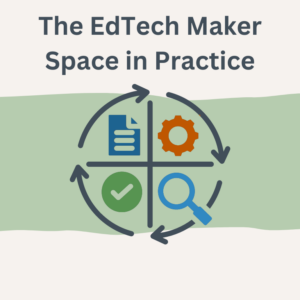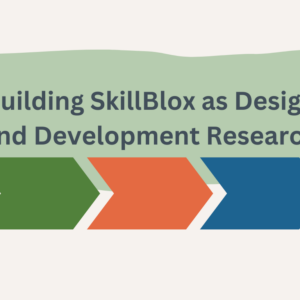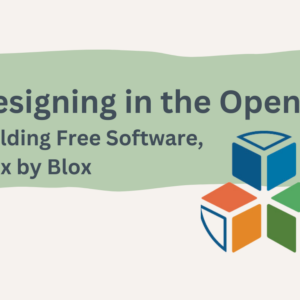By Jamie Kreil, PhD and Jen Vanek, Ph.D
By connecting with program managers and instructors across the US, the EdTech Center crafts use scenarios that illustrate where different online comprehensive curricula fare well and how they are used. In this post, we describe how a large community education program in Illinois used Learning Upgrade to support content across its extensive programming. This is blog post number three in a four-part series reporting on conversations that the EdTech Center has had with program directors, teachers, and learners using Learning Upgrade. Read Online Platform Supporting Classroom Instruction: Rockingham’s Success with Learning Upgrade to understand how a rural program in North Carolina used Learning Upgrade to support its one-room schoolhouse approach to teaching and Tutors and App-Based Remote Learning: Siena Literacy Center’s Success with Learning Upgrade to see how one program used Learning Upgrade in their tutor-supported programming.
What is Learning Upgrade?
Learning Upgrade offers over 1,000 lessons covering multiple levels and content in English, math, GED preparation, digital literacy, and reading. Instruction is delivered through rich graphics, videos, and music. The platform was made widely available across the US through Adult Literacy XPRIZE Communities Competition in 2018. In a subsequent initiative, the Learning Upgrade Challenge, students have gained prizes for use of the tool, and teachers and programs who have had the most use of the app won extended licenses. The EdTech Center@World Education reached out to programs that have made good use of Learning Upgrade to better understand how and with whom it has the most potential impact before and now during the pandemic.
District 214 Community Education: Arlington Heights
District 214 Community Education is a large community education program in the state of Illinois. The program has over 70 years experience providing youth, adult, and continuing education to residents in Cook County. The Adult education and Family Literacy program in Arlington Heights offers English as a Second Language (ESL), College and Career Readiness (CCR), citizenship and Reading 101, a high-level ESL reading course. There is a women and children’s center for women with children under age five and a volunteer-run program, Read to Learn. The program’s annual enrollment for FY2020 was 1,164 students. The percentage of ESL students was 84.8%. Their staff consists of 28 part-time adult education instructors, 9 support staff, an additional 9 staff members work in Family Literacy in support of the program and one full-time Program Supervisor.
Arlington Heights introduced Learning Upgrade to ESL and ABE students representing 14 different countries. While the ESL program includes beginning to advanced levels, only low-intermediate students used Learning Upgrade. High-level ABE learners testing on a TABE 11/12 also used the application. Results of this initial introduction to Learning Upgrade revealed that higher-level learners tended to use the application more because they had been actively using technology in class.
Why Learning Upgrade?
We talked to Laurice Hoffman, the Coordinator of Adult Literacy Volunteer Services, and three students to learn more about how Learning Upgrade supported the extensive programming offered in Arlington Heights. Laurice shared that Learning Upgrade was a good fit because the array of content could be used across programs. She also saw the benefit of using Learning Upgrade as an optional learning tool to keep students learning over a break. While optional, students maintained interest in using the tool through competition with one another and appreciation of music to deliver instruction during free time at home, in transit, or at work.
Making Progress through Competition
The students who were most engaged in this program embraced Learning Upgrade as a form of friendly competition. Two of the three students interviewed for this blog post spurred each other’s progress by knowing how the other was doing. One student, Monika, used Learning Upgrade consistently and was the leader shown on the class leaderboard. Seeing Monika’s name listed as the leader, another student, Anitha, responded to the challenge to compete. Monika pushed Anitha, who said, “I know I wanted to at least get 90 percent.” When set up like a game, these two students increased focus on level completion and achieving the gold prize.
By setting up students with Learning Upgrade and framing use as a competition prior to leaving for a break, Arlington Heights leveraged their resources to keep adult students learning. Anitha discussed being set up with a link and using a laptop to access Learning Upgrade while her 3-year old slept. Monika accessed Learning Upgrade on her phone at home, while in transit, or at work.
Anitha and Monika both spent most of their time using Learning Upgrade in the evenings. For example, one weekend night, Anitha logged on for five hours because she wanted to complete a level. Monika discussed using the tool for anywhere from 30 minutes to three hours. She said she used it frequently because she wanted to complete every level and even repeat them if she doesn’t achieve 100%.
Music for Improved Concentration
Instruction through music is a unique feature of Learning Upgrade. The music videos rely on animation, rhymes, and repetition to support learning content. Check out the example here and others in the YouTube playlist.
While the students we interviewed had different reasons for using Learning Upgrade, they all found the music feature to be a support for learning remotely. Laurice Hoffman noted that learners who weren’t open to learning through music didn’t persist in the app. However, we noted from our interviews that those who actively used Learning Upgrade were parents, indicating that children may be learning with them. In addition to this, some learners discovered the music helped them remember new vocabulary. Below are some testimonials these students made about how music strengthened their concentration and improved organizational and language skills:
- The music is “very good because you can enjoy when you concentrate. I liked the music; I’m a music lover.” Anitha
- “It’s good. I like it because they repeat and you can’t forget about it. Because you can sing until you remember. When I sing, I easily remember some words. It’s perfect.” Monika
- “[The music] helps me focus on what to write in my notebook.” Monika
- “In Poland, when I started English, I did simple songs– ABC or something. When I like one popular song, I will try to sing it.” Monika
- “It was very funny – I like this. Because you are so tired and that helps you to feel better. I was surprised to see the music and animation – it was a good surprise. Irina
- “I listened [to a song] only once – used a translator. Sometimes I decided that I had a silly mistake and I did something wrong so I repeated.” Irina
Learning Upgrade’s use of music to deliver instruction helped students at Arlington Heights develop learning strategies for vocabulary. The ability to sing and repeat songs contributed to increased retention and mastery of content. Anitha, Monika, and Irina repeated songs to remember words and correct past mistakes. In addition to taking screenshots of the music videos, Monika used Learning Upgrade’s music to direct her focus on what she wanted to learn and remember, contributing to personal organization skills to help her study vocabulary.
Take Away
This third blog post shares an example of how Learning Upgrade contributed to learner persistence and skill development in remote learning. The big takeaway here is that Learning Upgrade can be used anywhere, at any time, meeting the shifting needs of adults during the COVID-19 pandemic. The gamification factor has appeal to students motivated by friendly competition. Programs might pitch use of Learning Upgrade as a fun way to learn in the evening – after the workday and family tasks are done. Students looking for a way to continue learning and open to its informal appearance will likely find it fun and engaging.





1 Comment.
This is interesting. Where in the world is Arlington Heights?